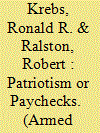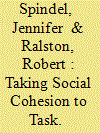|
|
|
Sort Order |
|
|
|
Items / Page
|
|
|
|
|
|
|
| Srl | Item |
| 1 |
ID:
188883


|
|
|
|
|
| Summary/Abstract |
Narratives of national decline occur frequently, often independent of “objective” measures of decline. What causes declinism? First, I argue that declinism most often comes from opposition brokers. Brokers bring otherwise unconnected groups and individuals together in a coalition. This coalition is well positioned to blame the nation’s decline on the establishment. Second, I argue that negative events or conditions help narratives of decline resonate with audiences. Using text analyses of UK parliamentary speech, I show that declinism was rampant in late-1970s Britain. I show how two brokers—Margaret Thatcher and Keith Joseph—brought together previously unconnected groups to create a coalition that centered on British decline. Negative events, particularly the “Winter of Discontent,” helped declinism resonate, something the coalition recognized and exploited. Finally, I trace the foreign policy consequences of Thatcher’s declinism, particularly with respect to the Falklands War.
|
|
|
|
|
|
|
|
|
|
|
|
|
|
|
|
| 2 |
ID:
183833


|
|
|
|
|
| Summary/Abstract |
Although voluntary recruitment to the military is today the Western norm, we know little about citizens’ beliefs regarding service members’ reasons for joining. This article, reporting and analyzing the results of a nationally representative U.S. survey, rectifies this gap. We find that, despite the reality of market-based recruitment, many Americans continue to subscribe to an idealized image of service members as moved by self-sacrificing patriotism. This belief is most heavily concentrated among conservative Americans. Liberal Americans are more likely to believe that service members join primarily for economic reasons. Those furthest to the left are more inclined to aver that service members join chiefly to escape desperate circumstances. Perhaps most surprising, we discover a disconnect between respondents with military experience and their families: The former are more likely to acknowledge that pay and benefits are a primary motivation for service, whereas their families are more likely to embrace a patriotic service narrative.
|
|
|
|
|
|
|
|
|
|
|
|
|
|
|
|
| 3 |
ID:
171801


|
|
|
|
|
| Summary/Abstract |
Recent political debates over the inclusion of transgender servicemembers in the US military center around the impact such inclusion will have on unit cohesion and effectiveness. Missing from the debate, however, are the perceptions of those who do the soldiering. What are their perceptions of cohesion? Do they, like political leaders and the general public, believe unit cohesion leads to military effectiveness? In other words, how much does the narrative at the elite level—that insists excluding minority groups is a military necessity—match the perceptions of those who serve? Drawing on an original survey of 151 current and former members of the US military, our results suggest that servicemembers’ perceptions mirror those in the general public: political ideology is correlated with beliefs that minority groups disrupt unit cohesion. We find that conservatives are more likely to believe that the inclusion of transgender soldiers will negatively impact cohesion and undermine unit effectiveness. Moreover, conservatives are more likely to endorse a conceptualization of cohesion that hinges on the social—“people like me” or “band of brothers”—dynamics of cohesion rather than more professional, task-oriented conceptions of cohesion. However, military experience affects these perceptions: respondents with combat experience, who held/hold a higher rank, and who are currently serving are more likely to endorse a task-based conception of cohesion that ties cohesion to professionalism and competence, rather than social identity.
|
|
|
|
|
|
|
|
|
|
|
|
|
|
|
|
| 4 |
ID:
183842


|
|
|
|
|
| Summary/Abstract |
Are Americans aware and concerned about White nationalism in the U.S. Military? Our large and demographically representative survey suggests that while most Americans suspect at least some presence of White nationalism in the military, many do not view it as a serious problem; particularly self-identified conservatives and respondents who hold highly favorable views toward military service members. However, in a between-/within-subjects experiment embedded in our survey, we show that providing information about the issue of White nationalism in the U.S. Military increases the public’s overall concern about White nationalism in the U.S. Military.
|
|
|
|
|
|
|
|
|
|
|
|
|
|
|
|
|
|
|
|
|